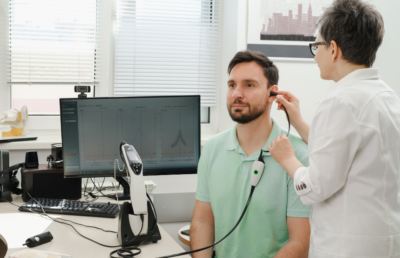It’s never easy when a parent has hearing loss. There are a number of challenges standing in your way, and many families tend to live with the issue longer than they should before getting their loved one the treatment he or she needs.
Some of the challenges children of aging parents face include:
- The gradual progression of hearing loss — frequently, hearing loss happens slowly over time, which makes it harder for the person it’s happening to become aware of the problem. A person may begin to unknowingly do things to compensate for the hearing loss, such as standing closer to those who are speaking, or turning up the TV louder (which is why a loud TV is one of the clear signs of hearing loss).
- A desire for independence — it’s perfectly natural for parents to want to maintain some level of personal independence. That may mean that they don’t want to admit they are experiencing hearing loss and they may be hesitant to agree to go in for a test and treatment. They may also think that some amount of hearing loss is normal as they age and just want to live with it.
- Worries about cost of treatment— parents may think that hearing aids would cost a significant amount of money and be worried that they can’t afford the costs of treatment. That may lead them to ignore or minimize the importance of their hearing loss.
- Lack of familiarity with advances in the field — parents may remember the bulky hearing aids of days gone by and be hesitant to commit to wearing such a device. Of course, they may not know that modern hearing aids are a fraction of the size of the old ones and are made to fit into a patient’s life much more seamlessly and conveniently.
One thing we do know is that again and again we’ve interacted with patients whose children have brought them in for a hearing test after having to do some convincing. In nearly every case, after the patient gets comfortable, reviews his or her options, and gets set up with a hearing device, they’ve reported dramatically improved quality of life. Their independence can be maintained as children know their parent is hearing optimally when at home or out.
Wondering how to approach the subject?
- Start By Simply Asking
Ask your parent if they have had any problems hearing (in a non-threatening manner). Example: “When we were at dinner last night, I noticed you couldn’t understand the waitress, is that correct?”
- Express Urgency for Treatment
Express urgency in getting hearing loss treated. Hearing loss can cause people to become isolated, depressed, and also have cognitive decline.
For more tips on how to broach the subject of hearing loss with a loved one, see our page on Starting the Conversation.





